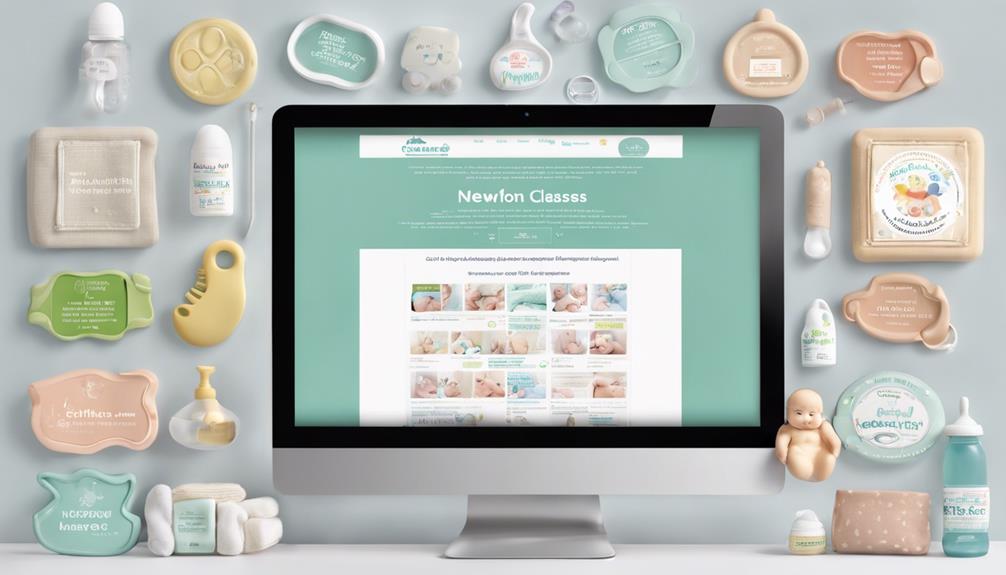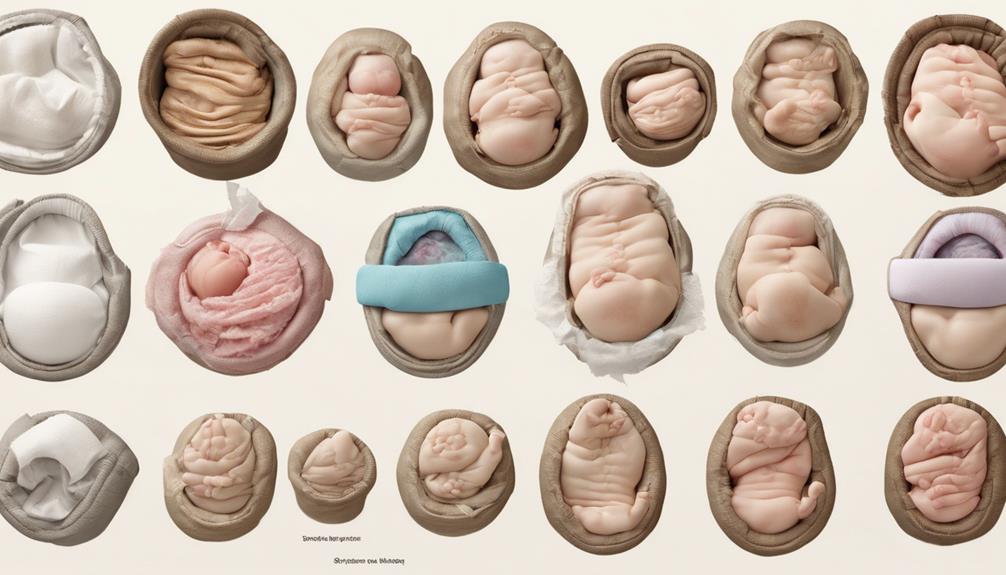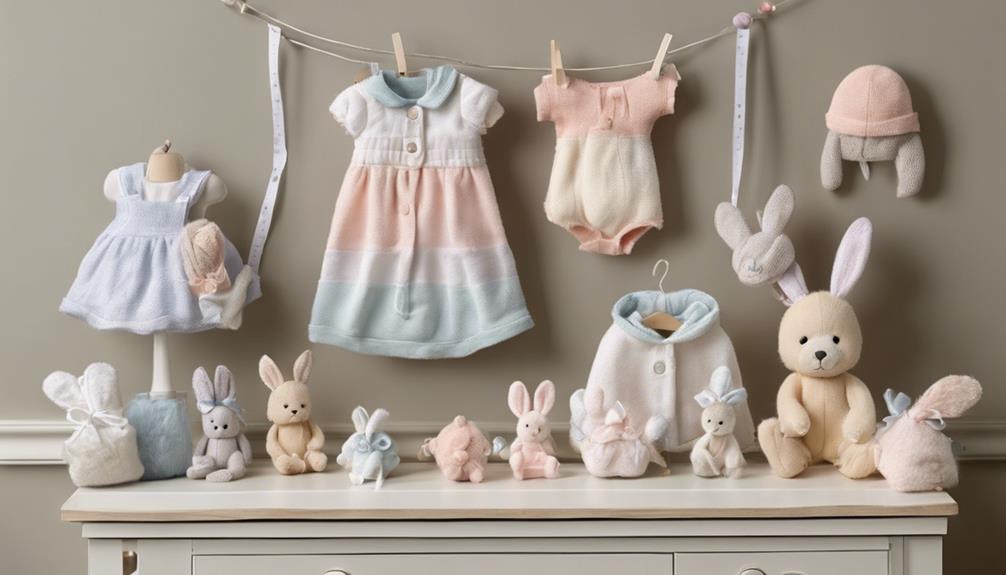When my partner and I welcomed our newborn, we were taken aback by the pungent odor of his diaper changes. It seemed like a never-ending battle to combat the stinky mess.
However, through trial and error, we discovered some effective strategies to tackle the issue. From selecting the right diaper to incorporating specific dietary adjustments, we learned the importance of addressing the underlying causes of the smell rather than just masking it.
Join us as we uncover the seven ways to handle stinky newborn poop and make those diaper changes a bit more bearable.
Key Takeaways
- Use odor-locking diaper pails for effective disposal.
- Change diapers promptly to maintain a fresh nursery.
- Prioritize absorbent diapers with snug fits.
- Apply barrier cream to prevent diaper rash.

Ubbi Steel Diaper Pail, Odor Locking, No Special Bag Required, Award-Winning, Registry Must-Have, White
POWDER-COATED STEEL: The Ubbi Diaper Pail is made of powder-coated steel, which provides superior odor control compared to…
As an affiliate, we earn on qualifying purchases.
As an affiliate, we earn on qualifying purchases.
Proper Diaper Disposal
When dealing with stinky newborn poop, it's essential to utilize disposable diaper pails with odor-locking technology for effective containment and neutralization.
As caregivers ourselves, we comprehend the struggle of dealing with those dirty diapers. Using diaper pails with foot pedals for hands-free operation can be a game-changer, minimizing the exposure to those unpleasant odors.
Remember to seal the dirty diapers in biodegradable bags before disposing of them to help reduce the overall odor. Consider adding scented diaper pail liners or deodorizing disks to your diaper pail for an extra layer of defense against the potent smells of baby poop.
These small additions can make a big difference in maintaining a fresh-smelling nursery environment. By incorporating these simple yet effective steps into your diaper disposal routine, you can tackle the stink while keeping your hands clean and your baby's nursery smelling pleasant.

USBOO Baby Disposable Diaper Bags,300 Count Oxo-Biodegradable Diaper Sacks,Easy-Tie Handles,Diaper Disposal or Pet Waste Bags, Unscented
PREMIUM DIAPER SACKS: Our premium ( 7”x13.5”/300count) nappy sacks come out of box one at a time. Very…
As an affiliate, we earn on qualifying purchases.
As an affiliate, we earn on qualifying purchases.
Odor-Eliminating Techniques
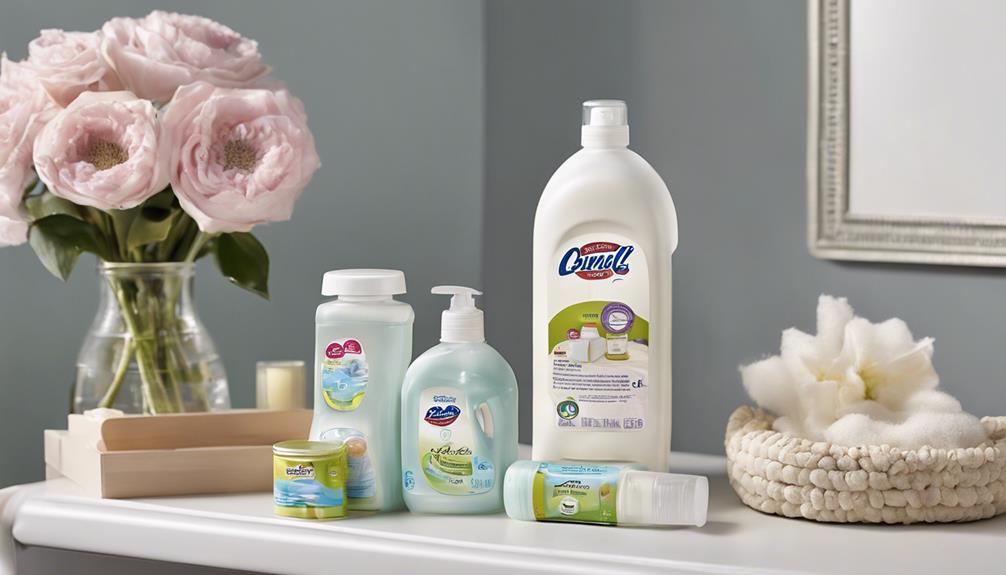
To combat the persistent smell of newborn poop in your nursery, consider implementing these proven odor-eliminating techniques. Utilize odor-neutralizing diaper pail systems to guarantee and minimize the odor effectively.
Promptly dispose of dirty diapers to prevent lingering odors from permeating the nursery. Improving ventilation by opening windows or using air purifiers can help reduce the concentration of poop odor in the room.
For an extra layer of odor control, consider using scented diaper disposal bags or diaper pail deodorizers. When using cloth diapers, make sure they're washed promptly and thoroughly to prevent the buildup of odor-causing bacteria.

Diaper Genie Bags Refills 270 Count (Pack of 3) Clean Laundry Scent | Diaper Pail Refills with Max Odor Lock | Holds up to 810 Newborn Diapers
TRAP STINKY ODOR: Diaper Genie bags refills feature Max Odor Lock with a built-in antimicrobial to prevent germ…
As an affiliate, we earn on qualifying purchases.
As an affiliate, we earn on qualifying purchases.
Choosing the Right Diaper
Combatting the persistent smell of newborn poop starts with choosing the right diaper that offers good absorbency and odor-blocking technology. When selecting diapers for your little one, prioritize ones with excellent absorbency to contain and neutralize the odor of newborn poop effectively.
Look for diaper brands that incorporate odor-blocking technology to minimize those stinky smells that can linger in the nursery. Opt for diapers with a snug fit around the legs and waist to prevent leakage, which can contribute to odor issues.
It's essential to dispose of dirty diapers promptly in a sealed diaper pail or trash bag to further minimize odor in the nursery. Remember to change diapers frequently, especially after bowel movements, as this can help keep stinky newborn poop under control.

Diaper Genie Carbon Filter (4-Pack) | Diaper Pail Odor Eliminator & Deodorizer | Compatible with the Diaper Genie Complete and Expressions Pail
ABSORB & NEUTRALIZE STRONG ODOR: The Diaper Genie Carbon Filter is designed to attract pungent odor and eliminate…
As an affiliate, we earn on qualifying purchases.
As an affiliate, we earn on qualifying purchases.
Quick and Efficient Cleaning
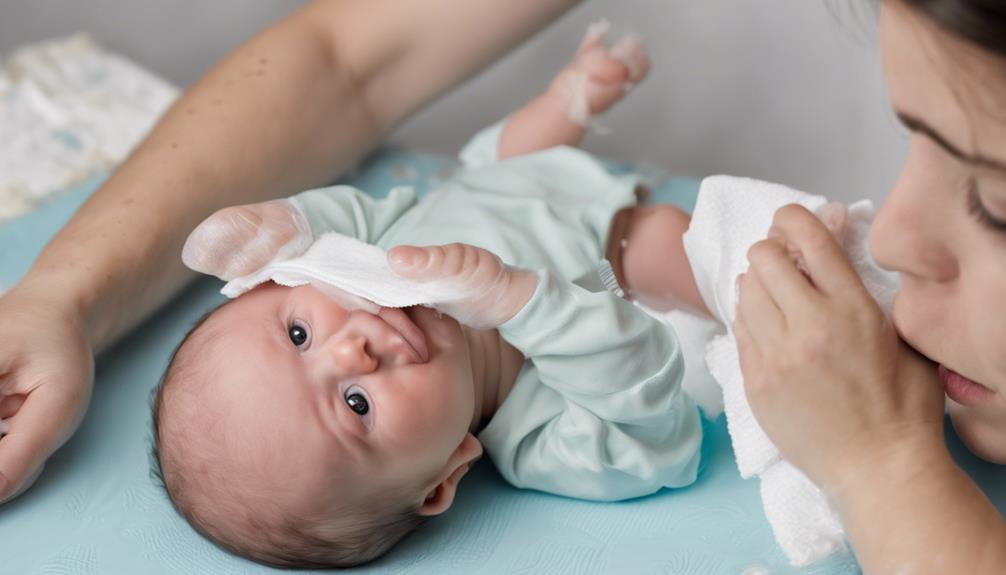
For efficient cleaning after diaper changes, consider using fragrance-free baby wipes or warm water with a soft cloth to gently cleanse your baby's bottom. When dealing with newborn poop, it's crucial to lift your baby's legs while cleaning to access hard-to-reach areas and prevent the stool from spreading. Remember to clean from front to back, especially for baby girls, to avoid infections.
After cleaning, make sure to pat your baby's bottom dry with a soft towel to prevent diaper rash. To further protect your baby's delicate skin, apply a thin layer of diaper cream to act as a barrier against any irritation caused by bowel movements. Pay attention to the color and consistency of your baby's stool, as they can indicate digestion and overall health.
Preventing Diaper Rash
When caring for your newborn, keeping their delicate skin healthy and free from irritation is key, starting with preventing diaper rash through proper hygiene and skin care practices. To shield your baby's skin from irritation caused by moisture buildup, make timely diaper changes.
Use a barrier cream or ointment during each change to create a protective layer. Let your baby's bottom air dry before putting on a fresh diaper to minimize dampness. Opt for fragrance-free wipes to gently clean your baby's skin and prevent any potential irritation.
Additionally, choose breathable and absorbent diapers to keep your baby's skin dry and reduce the risk of diaper rash. By incorporating these simple steps into your diaper-changing routine, you can help safeguard your baby's delicate skin and keep them comfortable and happy.
Frequently Asked Questions
Why Does My Newborn's Poop Smell so Bad?
Our newborn's poop may smell bad due to the presence of bacteria breaking down milk components. Their immature digestive system and diet play a role. Formula-fed babies might have smellier poop. Changes in diet can also alter the odor.
What Is Unhealthy Poop for Newborns?
When it comes to unhealthy poop for newborns, we need to watch out for red, black, or white colors. These signs might point to serious medical issues, so it's important to consult a pediatrician promptly.
What Causes Acidic Poop in Breastfed Babies?
When breastfed, babies can have acidic poop due to lactose issues, gut imbalances, infections, or maternal diet. It's important to monitor diet, seek medical advice, and provide comfort during this phase. Trust your instincts and consult healthcare providers for guidance.
Why Does My Baby's Poop Smell Like Halitosis?
When our baby's poop smells like halitosis, it could be due to various factors like immature digestive systems, excess sugar in milk, or bacterial infections. Consulting a pediatrician is important to address this issue effectively.
Conclusion
To sum up, handling stinky newborn poop can be a stinky situation, but with the right tools and techniques, it doesn't have to be a stinky problem. Remember, where there's a will, there's a way!
By following these tips and tricks, you can keep your baby clean, comfortable, and smelling fresh. Don't let the poop get you down – you've got this!


